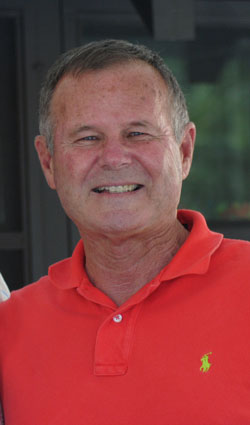Riverside County Sheriff Stan Sniff is seeking re-election to his third term. In 2010, he was re-elected with more than 65 percent of the votes cast. In 2014, Sheriff’s Lt. Chad Bianco ran, but Sniff received 63 percent of the vote.
In 2018, nearly 11 years after his original appointment as sheriff, he is facing two challengers in the election — Dave Brown, former chief of Hemet City Police, and Bianco. Miguel Garcia, a deputy sheriff in the Moreno Valley station, has filed papers to run, but has not replied to email and phone requests for an interview.

Sniff is a native to Riverside County. He grew up in Indio, where his father served on the city council while a member of the Sheriff’s Department. Sniff began his 43-year law enforcement career as a member of the Coachella Police Department in 1975. Four years later, he transferred to the Riverside County Sheriff’s Department, where he rose through the ranks to assistant sheriff. In 2007, when former Sheriff Robert Doyle resigned to take a state position, the Board of Supervisors chose Sniff as sheriff.
Sniff is seeking re-election in a turbulent time for the department’s budget. But that is exactly why he wants to continue. To him, the department’s leadership is not an issue, rather it is the ability to grapple and balance the effect of the state propositions (47 and 64, and Assembly Bill 109) affecting jail terms and criminal charges with the financial resources the county can provide.
Sniff realizes that he is elected by county voters, but the board provides the funding. And he has always said he will manage the department with what the board authorizes.
“I’m experienced and independent,” Sniff said proudly. He will tell the board what he honestly believes is the effect of its funding decisions. He recognizes that, while his department is the county’s largest, it is just one of many.
He will tell them that the ratio of deputies to population in the unincorporated areas is too low. Yet once the budget is approved, he will implement it and manage it for the good of the whole county.
“But in the end, my job is to be a good manager,” Sniff affirmed. “I’m to be independent and honest and open. It’s not my decision; my role is to give input.
“If I acquiesce to the costs, if the department malfunctions, it is not the board at fault. I’m ultimately accountable. If I don’t speak the truth, it’s hard for them to make an informed decision,” he stated.
While he and the board know that the fiscal year begins with an expected deficit for the sheriff’s office, he manages to finish the year without needing reserves to augment the department’s costs.
Last year, we had a $2.7 million surplus,” he said. And this week, the County Executive Office told the board that the sheriff’s budget would end the year with another surplus.
Sniff also feels the department has changed and improved during his tenure in other ways. “I’m proud that the department has dramatically re-shaped its diversity. It matches the demographics of the communities and will continue to.”
In addition, he pointed to the educational level of its staff and how it has increased. “It’s a different work force than 1975,” he noted.
Staffing statistics are not the only accomplishments Sniff highlights. “We cut the crime rate last year. In cities that contract with us, and the county, the crime has gone down,” he emphasized, “and down while costs are up.”
But Sniff maintains that his long-term goal is to raise the staffing in the unincorporated areas of the county, which includes Idyllwild and the whole Hill. He argued that the staffing ratios are a relevant measure. “It’s a visible deterrent to see patrol cars once a day rather than one per month.”
Also, he wants to hire more deputies to re-fill the task forces from which he had to cut staffing in the past.
“My costs are driven by people costs. It’s 90 percent of the budget,” he stated. “The rate of growth [in our budget] is based on salaries. The 50-percent increase in the last decade is not sustainable.”
While staffing has been reduced in response to the budget, that is only one piece, Sniff emphasized. The overcrowding of jails and prisons has resulted in federal court orders, state propositions and AB 109 that require the early release of many non-violent offenders or reduce their sentences.
Regarding the current issue of sanctuary city laws, Sniff’s opposition is that they are bad public policy. These laws interfere in the exchange of information between law enforcement agencies at different governmental levels.
In fact, he said, “Just a small percentage of our crime is committed by undocumented immigrants. It’s a myth that there is a local crunch.” Rather, he attributed the lack of adequate jail capacity as a bigger challenge.
Sniff acknowledged the cheating that occurred on the sheriff’s exam. But he accentuated that the allegations “were looked at closely. The attorneys involved defended the disciplinary actions. The department meted out discipline.”
But these are law enforcement personnel actions, and he and others cannot discuss them. So, his defense of the charges of “not caring” is limited. He noted that a county Grand Jury was formed as an independent review and had no report.










